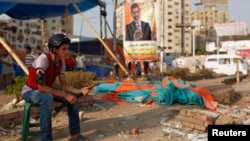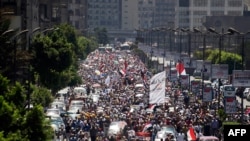Supporters of ousted Egyptian president Mohamed Morsi are defiantly remaining at their protest camps in Cairo, despite days of warnings that the government would soon move on the sites.
Large crowds of pro-Morsi protesters were at the camps Monday night, chanting, waving flags and holding up signs of the man they say should be reinstated as president.
Saba Mahmood, associate professor of anthropology at the University of California at Berkeley, told VOA English to Africa the interim government has not broken up the camps because the resulting bloodshed would be a "very serious political cost."
But she says Morsi's Muslim Brotherhood is facing bigger stakes than getting him back in office, after the arrests of other key members of the group and moves to freeze assets it uses for political work and providing services to the community.
"So there is that issue that if indeed they back down, they're going to not just imply lose Morsi, but they're going to lose even the basis - the political, social basis - they have build over the last 40 years," said Mahmood.
The interim government, which the military installed after deposing Morsi last month, is moving ahead with a transition roadmap that involves reforming Egypt's constitution and holding elections early next year.
The Nour Party, which is the second-largest Islamist group after the Brotherhood, says it will continue to be a part of the committee to reform the constitution, despite its reservations about the process. A statement late Monday expressed concern about changing the Islamic nature of Egypt.
Also Monday, the Egyptian judiciary announced it extended Morsi's detention by 15 days to investigate allegations that the Palestinian militant group Hamas helped him and other Islamists break out of prisons during Egypt's 2011 revolution.
Egyptian authorities have kept Morsi in custody since his July 3 ouster.
The government accuses the mostly Islamist pro-Morsi protesters of inciting and engaging in attacks against the security forces. More than 250 people have been killed in political violence since Morsi's overthrow.
Western and Arab mediators have been trying to persuade the Egyptian government to avoid using force to disperse the protesters, fearing a new wave of bloodshed.
Large crowds of pro-Morsi protesters were at the camps Monday night, chanting, waving flags and holding up signs of the man they say should be reinstated as president.
Saba Mahmood, associate professor of anthropology at the University of California at Berkeley, told VOA English to Africa the interim government has not broken up the camps because the resulting bloodshed would be a "very serious political cost."
But she says Morsi's Muslim Brotherhood is facing bigger stakes than getting him back in office, after the arrests of other key members of the group and moves to freeze assets it uses for political work and providing services to the community.
"So there is that issue that if indeed they back down, they're going to not just imply lose Morsi, but they're going to lose even the basis - the political, social basis - they have build over the last 40 years," said Mahmood.
The interim government, which the military installed after deposing Morsi last month, is moving ahead with a transition roadmap that involves reforming Egypt's constitution and holding elections early next year.
The Nour Party, which is the second-largest Islamist group after the Brotherhood, says it will continue to be a part of the committee to reform the constitution, despite its reservations about the process. A statement late Monday expressed concern about changing the Islamic nature of Egypt.
Also Monday, the Egyptian judiciary announced it extended Morsi's detention by 15 days to investigate allegations that the Palestinian militant group Hamas helped him and other Islamists break out of prisons during Egypt's 2011 revolution.
Egyptian authorities have kept Morsi in custody since his July 3 ouster.
The government accuses the mostly Islamist pro-Morsi protesters of inciting and engaging in attacks against the security forces. More than 250 people have been killed in political violence since Morsi's overthrow.
Western and Arab mediators have been trying to persuade the Egyptian government to avoid using force to disperse the protesters, fearing a new wave of bloodshed.






